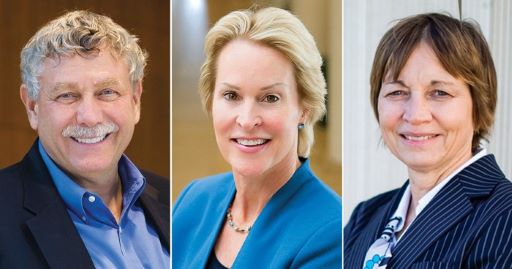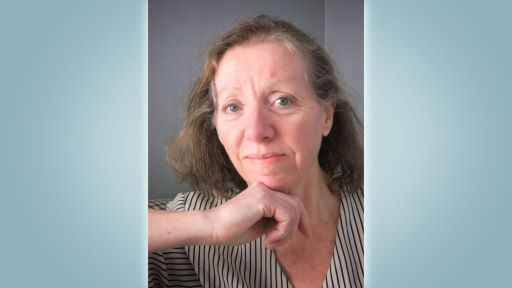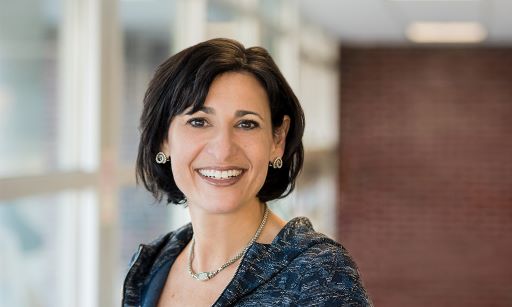RFS Briefings - January 19, 2021Dear Colleagues, President-elect Joe Biden is signaling that scientists will assume prominent roles in his administration! He named Nobel chemistry laureate Frances Arnold, a pioneer in synthesizing artificial proteins, and MIT Vice President for Research Maria Zuber, a planetary scientist who led efforts to map the surfaces of the moon and Mars, to head the President’s Council of Advisors on Science and Technology. They will be the first women to co-chair the council. Biden plans to make the White House Office of Science and Technology Policy a Cabinet-level agency. Alondra Nelson, the president of the Social Science Research Council, will serve as the OSTP’s deputy director for science and society.  Eric Lander, Frances Arnold, and Maria Zuber. Credit: Biden-Harris Transition (Lander), Caltech (Arnold), Bryce Vickmark (Zuber), via C&EN. Eric Lander, Frances Arnold, and Maria Zuber. Credit: Biden-Harris Transition (Lander), Caltech (Arnold), Bryce Vickmark (Zuber), via C&EN.Sharon Begley, Senior writer at STAT, sadly passed away on January 16th in Boston. Sharon was a great leader at STAT, and interviewed by Mary Ann Liebert last year at our colloquium at the Wistar Institute. She will be greatly missed.
Please continue to share important news and opportunities with us so that we may share it with you and others who are committed to supporting the careers of exceptional women in science.
With regards in these trying times, Karla Shepard Rubinger News Inside the C.I.A., she became a spy for planet Earth. Linda Zall is disclosing how she toiled anonymously within the intelligence agency to help scientists intensify their studies of climate change. “She was an amazing leader,” said Michael B. McElroy, a planetary physicist and professor of environmental studies at Harvard. “She had energy and enthusiasm and a wonderful ability to communicate with people” — as well as the tact to handle large egos. “Having this woman from the C.I.A. telling them what to do wasn’t easy. It was amazing to watch her.”  Dr. Zall in Alaska in 1973.Credit..via Linda Zall/The New York Times.
Female scientists focus on a secret weapon to fight climate change: Moms. Climate researcher Katharine Hayhoe has teamed up with five fellow climate scientists to found Science Moms, a group that aims to demystify climate change, talk honestly about how it will affect their children and give moms the facts they need to take action. The campaign has a website featuring facts and resources, including links to books on talking to kids about climate and a form for contacting elected officials. “As the new C.D.C. Chief, I’ll tell you the truth, even when the news is bleak.” Rochelle P. Walensky has been chosen by President-elect Joe Biden to be the director of the Centers for Disease Control and Prevention. “I promise to work with my colleagues at the C.D.C. to harness the power of American science to confront the enormous challenges we face,” she wrote in an opinion piece for The New York Times.
Fifteen-year-old Gitanjali Rao is a scientist, inventor, and TIME Magazine's first-ever 'Kid Of The Year.' In this episode of Short Wave, she shares why she didn't initially think science was for her, what motivates her now, and a bit of advice for other budding innovators. Developmental Biologist Kathryn Anderson dies at 68. Kathryn Anderson, a developmental biologist at the Memorial Sloan Kettering Cancer Center known for her work detailing the genetics of early embryogenesis, died November 30 at age 68. For her contributions to the field of developmental biology, Anderson was inducted into the National Academy of Sciences in 2002 and elected as a member of the Institute of Medicine of the National Academies in 2008. Sisters who kicked down the door of the US medical establishment. Writer and historian Janice Nimura reveals the struggles faced by the first female physician in the United States, Elizabeth Blackwell, and her sister Emily, also a doctor, in a new book, The Doctors Blackwell. According to Hannah Wunsch, “it took until 2017 for women to make up more than half of US medical-school enrolment. And scepticism remains rampant that a woman, or a physician from a minority group, can wield a scalpel or provide expert advice as well as a white man.” One page at a time, Jess Wade is changing Wikipedia. By day, Jess Wade is an experimental physicist at Imperial College London. But at night, she writes entries about women and POC scientists on Wikipedia. In this episode of Short Wave, she chats with Emily Kwong about how Wikipedia can influence the direction of scientific research and why it's important to have entries about scientists from under-represented communities. Meet 10 female scientists instrumental in developing COVID-19 vaccines around the world. “The various vaccines which have been developed in different parts of the world stem from the brain-racking and hard-work of many exemplary women who are dedicated to the cause of liberating the humankind from the clutches of the virus,” writes Sugandha Bora. MIT Society of Women Engineers’ journey into virtual connection. “When the student body was sent home last March in the face of the Covid-19 pandemic, the MIT Society of Women Engineers (SWE) faced its biggest challenge yet — transitioning nearly 70 in-person programming events to an entirely virtual experience,” writes Stephanie Tran. In addition to promoting diversity among women engineers, SWE seeks to introduce students of all ages, from grade school to high school, to STEM fields. Gwynne Shotwell talks about selling flight-proven rockets, Starship. Gwynne Shotwell, SpaceX’s president and chief operating officer, believes 2020 was a year of highlights. "There's probably 10 things that I would look back on this year and say were extraordinary.” Safely launching astronauts was probably the biggest one, however. "Getting Bob and Doug to orbit and back safely, especially in that timeframe, it was such a terrible time in the world, that was great," she said. Diversity in STEM‘I was no longer pretending or hiding’: a trans scientist finds a lab to call home. In an article for Nature News, materials scientist Clara Barker praises the University of Oxford for creating a welcoming space. “What’s most inspiring about our lab is the people I work with: they accept me and treat me as a scientist, so that I can just focus on my work. Since I came here in 2015, Oxford has given me a platform for me to share my story as a trans scientist through talks and articles. It’s such a privilege and an honour to have that visibility,” Barker says. How to include Indigenous researchers and their knowledge. Despite long-standing calls to increase diversity on university campuses, Indigenous researchers remain poorly represented in STEM fields. Nature spoke to four Indigenous academic scientists about the challenges they face, and how scientists can respectfully and effectively bring together traditional knowledge and Western science. Lack of support undermines minority and female chemistry PhDs. A recent paper shows that graduate students from a racial/ethnic group traditionally underrepresented in chemistry were significantly less likely than other students to report that their financial support was sufficient to meet their needs. They were also less likely to report having supportive relationships with peers and postdocs, and advisors. Women and minorities in weather and climate fields confront harassment, lack of inclusion. Professional scientific groups, like The American Geophysical Union (AGU) and the American Meteorological Society (AMS), say they are ideally positioned to create change. According to the Washington Post, more than 120 science societies in 2019 banded together to form the Societies Consortium on Sexual Harassment in STEMM to coordinate standards of conduct and share information. ResourcesThe National Academies of Sciences, Engineering, and Medicine released a new podcast, The Science of Mentorship. This 10-part series explores how students in STEMM can discover more of their potential when they have responsive and effective mentors, told through the personal stories of top researchers in the United States. Learn how evidence-based mentorship practices can help you develop the skills to engage in the most effective STEMM mentoring relationships possible. The first episode features the incoming Chair of the Committee on Women in Science, Engineering, and Medicine, Dr. Gilda Barabino. Founded by 500 Women Scientists, Gage is a new global search platform where journalists, media outlets, conference planners and others seeking brilliant voices in science can discover women and gender minorities in STEMM. Their mission is to serve society by making science open, inclusive, and accessible. OpportunitiesNominations are now open for the National Academy of Medicine's 2021 Gustav O. Lienhard Award for Advancement of Health Care and Rhoda and Bernard Sarnat International Prize in Mental Health. Help the NAM recognize health care services pioneers and mental health innovators - nominate a colleague today! Nominations will remain open until April 16, 2021. The Simons Collaboration on the Global Brain is launching a Bridge to Independence Award! SCGB's BTI facilitates the transition of the next generation of systems and computational neuroscientists to research independence by providing grant funding at the start of their professorships. This request for applications (RFA) is aimed at Ph.D. and M.D.-holding scientists who are currently in training positions but intend to seek tenure-track research faculty positions during the upcoming academic job cycle. Fellows will receive a commitment of $495,000 over three years, activated upon assumption of a tenure-track research professorship. Marianna Limas, Social Media Manager |


